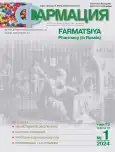Innovations and methodologies in research on problematic issues of drug supply
- 作者: Kabakova T.I.1, Goryachev A.B.2, Barkaev G.S.3, Iyro I.N.1, Magomedova F.T.3
-
隶属关系:
- Pyatigorsk Medical and Pharmaceutical Institute – branch of the Volgograd State Medical University of the Ministry of Health of Russia
- Federal State Autonomous Educational Institution of Higher Education First Moscow State Medical University named after. THEM. Sechenov Ministry of Health of Russia (Sechenov University)
- FGBOU HE Dagestan State Medical University of the Ministry of Health of Russia
- 期: 卷 73, 编号 1 (2024)
- 页面: 35-43
- 栏目: Organization and economy
- URL: https://bakhtiniada.ru/0367-3014/article/view/252234
- DOI: https://doi.org/10.29296/25419218-2024-01-05
- ID: 252234
如何引用文章
详细
Introduction. Increasing the efficiency of research in the field of organizing drug supply to the population is a priority task of pharmaceutical science. The study of the structure of scientific knowledge seems to be a relevant direction for its development. However, a methodological analysis of scientific works on the problems of drug supply has not previously been carried out as an independent study.
Purpose of the study: analysis of theoretical and methodological solutions in scientific works on the problems of drug supply.
Material and methods. Using the PICO tool, we formed an array of 61 dissertations defended in the period from 1991 to the present, on the problems of drug supply. The resulting array was studied using the methods of content analysis, grouping, graphical, comparative and scientometric analysis.
Results and discussion. It was found that during the study period, 34 types of innovations were used with a total frequency of their use in 53 cases. The average number of innovation types used was 2.97 per study. In total, scientists used 53 types of methodologies, of which 14 types were directly related to the field of drug supply. 226 cases of using various types of methodologies were identified, with the average number of their use per study being 3.68. The analyzed array contains 81 names of methods and groups of methods. The total frequency of their use was 531 cases, and the average number of methods per 1 dissertation was 8.69. In works on the problems of drug supply, 242 names of scientists and predecessors of the dissertation candidates were mentioned. 313 cases of their mention were identified, which amounted to an average of 5 names per dissertation. As a result, a methodological profile of scientific research on the problems of drug supply was formed using four analytical blocks.
Conclusion. Data were obtained on the constant scientific interest of scientists in problematic issues of improving the drug supply system. The presence of reserves for expanding the boundaries of the scientific field of pharmaceutical science has been established.
作者简介
Taisiya Kabakova
Pyatigorsk Medical and Pharmaceutical Institute – branch of the Volgograd State Medical University of the Ministry of Health of Russia
Email: kabtais@mail.ru
ORCID iD: 0000-0001-6182-5637
Doctor of Pharmaceutical Sciences, Associate Professor, Professor of the Department of Organization and Economics
俄罗斯联邦, Pyatigorsk, Kalinina Ave., 11, 357532Andrey Goryachev
Federal State Autonomous Educational Institution of Higher Education First Moscow State Medical University named after. THEM. Sechenov Ministry of Health of Russia (Sechenov University)
Email: abgor61@gmail.com
ORCID iD: 0000-0002-6844-4578
Doctor of Pharmaceutical Sciences, Associate Professor, Professor of the Department of Life Safety and Disaster Medicine
俄罗斯联邦, Moscow, st. Trubetskaya, 8, building 2, 119991Gasbulla Barkaev
FGBOU HE Dagestan State Medical University of the Ministry of Health of Russia
Email: bdgmu@yandex.ru
ORCID iD: 0000-0001-9075-3513
Candidate of Pharmaceutical Sciences, Associate Professor, Head of the Department of Pharmacy, Faculty of Pharmacy
俄罗斯联邦, Republic of Dagestan, Makhachkala, pl. Lenina, 1, 367000Irina Iyro
Pyatigorsk Medical and Pharmaceutical Institute – branch of the Volgograd State Medical University of the Ministry of Health of Russia
Email: irina_airo@yandex.ru
ORCID iD: 0000-0003-2650-9473
Doctor of Pharmaceutical Sciences, Professor, Professor of the Department of Pharmacy of the Faculty
俄罗斯联邦, Pyatigorsk, Kalinina Ave., 11, 357532Fazu Magomedova
FGBOU HE Dagestan State Medical University of the Ministry of Health of Russia
编辑信件的主要联系方式.
Email: fazu.magomedova@mail.ru
ORCID iD: 0009-0002-1116-7685
Candidate of Pharmaceutical Sciences, Senior Lecturer of the Department of Pharmacy, Faculty of Pharmacy
俄罗斯联邦, Republic of Dagestan, Makhachkala, pl. Lenina, 1, 367000参考
- Barkaev G.S., Kabakova T.I., Goryachev A.B. Cluster analysis of the complex concept of “medicine provision”: a review. Pharmacy&pharmacology. 2022; 10 (3): 232–43. doi: 10.19163/2307-9266-2022-10-3-232-243 (in Russian).
- Barkaev G.S., Kabakova T.I., Goryachev A.B., Korzhavykh E.A., Garumova M.A. Analysis of the information base for research on the problems of drug supply. Medical and pharmaceutical J. "Pulse". 2023; 25 (3): 97–106. doi: 10.26787/nydha-2686-6838-2023-25-3-97-106 (in Russian).
- Moshkova L.V., Korzhavykh E.A. Research methodology in the field of creating new drugs. Russian chemical J. 2010; 54 (6): 45–52 (in Russian).
- Dremova N.B., Kobzar L.V., Korzhavykh E.A. Methodology of domestic research on the need for medicines and their consumption. Pharmacy and pharmacology. 2015; 3 (10): 4–9 (in Russian).
- Korzhavykh E.A., Moshkova L.V., Shukil L.V. Methodological aspects of Russian research on pharmaceutical care. Pharmacy. 2016; 65 (1): 39–42 (in Russian).
- Kuznetsov D.A., Korzhavykh E.A. Managing the economic security of a pharmaceutical organization: system and methodology. Prospects for Science. 2015; 7 (70): 57–64 (in Russian).
- Methley A.M., Campbell S., Chew-Graham C., McNally R., Cheraghi-Sohi S. PICO, PICOS and SPIDER: a comparison study of specificity and sensitivity in three search tools for qualitative systematic reviews. BMC Health Services Research. 2014; 14: 579. doi: 10.1186/s12913-014-0579-0.
- Kharchenko K.V. The material side of life in the mirror of subjective meanings: the experience of content analysis. Sociology: methodology, methods, mathematical modeling. 2009; 28 (1): 129–47 (in Russian).
- Akoev M.A., Markusova V.A., Moskaleva O.V., Pislyakov V.V. Application of scientometric methods to evaluate scientific activities. In the book: Guide to Scientometrics: indicators of the development of science and technology. Ekaterinburg. Publisher: Ural Federal University named after B.N. Yeltsin, 2021; 279–311. doi: 10.15826/B978-5-7996-3154-3.010 (in Russian).
补充文件










